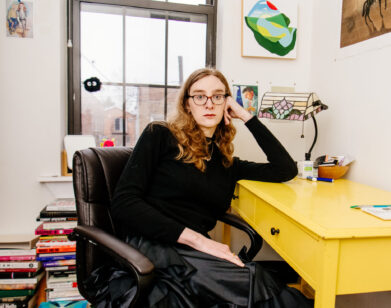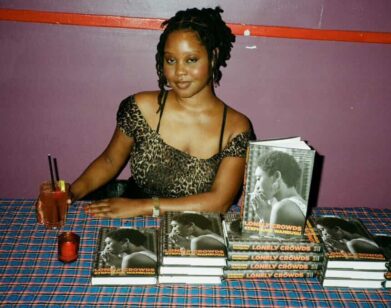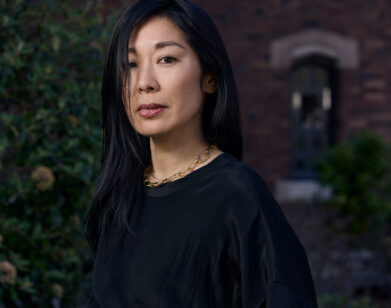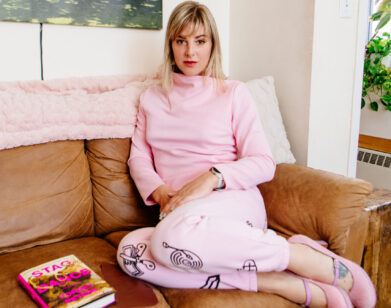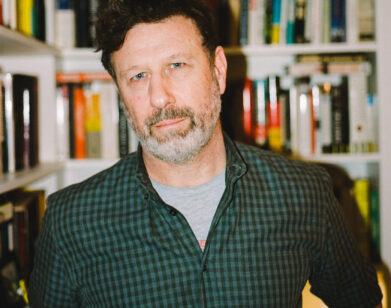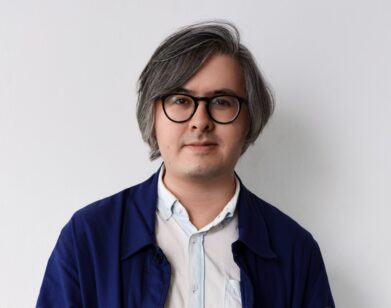LIT
In Author Laura van den Berg’s Latest Novel, Things Are Getting Weird in Florida
A few years ago, a friend and I joked about MFA vs. Florida; the panhandle, we determined, seemed to be inspiring more of a literary renaissance than the New York establishment. So last year, when Florida native Laura van den Berg announced her newest novel, I knew that therein we would find a portal to another, spectacular world. Since her debut short short collection, What the World Will Look Like When All the Water Leaves Us, her fiction has mapped surreal worlds where dead husbands mysteriously reappear and women ingest mouthfuls of sand on the beach at night.
With State of Paradise, her third novel, Van Den Berg “needed the gaze of the documentarian alongside the impossible” to accommodate the split-screen realities of the pandemic from her vantage point outside Orlando. When a ghostwriter returns home to the swelter of a Floridian summer, reality unspools, churning in its wake arresting insights about family, memory, and the very act of creation. On a stormy day before the book’s publication, Van Den Berg and I met on Zoom to discuss the uncanny, virtual reality, and her trademark blend of autofiction and the supernatural.
———
MICHAEL COLBERT: It’s so good to see you. I’m really excited to talk about the book.
LAURA VAN DEN BERG: Nice to see you too. I’m so glad it landed with you.
COLBERT: Yeah, it was really a pleasure. And I have to say, I love that we’re both in yellow on this dreary day.
VAN DEN BERG: That’s true. I’m in upstate New York right now and it’s very gray, very much not Florida. I’ve been really committed to color to try and counteract the weather a little bit.
COLBERT: Yeah, we have to do what we can. I think we’ll feel a little bit sunnier and warmer – in some ways – talking about this book. I remember seeing it teased a year ago and being so excited to read your Florida novel. Florida’s been so, as I’ve perceived it, in the cultural imagination for the past few years. There’s so much to talk about with this, but I need to ask first off – how much you were on Nextdoor while drafting this?
VAN DEN BERG: Oh, so much. Oh my gosh. I’d never been on Nextdoor before, partly because I’d mostly lived in cities and I think of it as being more of a suburban thing. But yeah, I read about poltergeists on Nextdoor. I read about witchcraft. I read about all kinds of attempted crimes that were sorted or not sorted, and just this spectacular range of human oddity. Nextdoor turned out to be this amazing treasure trove of material.
COLBERT: Yeah, I can imagine from the little time I’ve spent on it, but out of self-preservation I can’t stay because I would just be afraid people were complaining about me and my dog. Nextdoor is also connected to one of the key ideas in the book, this idea of wilderness and wildness, which the narrator feels inside of herself. Can we talk about that? How does that influence the characters? How do you relate to that idea?
VAN DEN BERG: Yeah, of course. So in January of 2020, my husband and I had just landed in Austin, Texas. We were there for a semester, teaching at UT Austin, and then the pandemic happened. We were in a temporary housing situation, and we didn’t really know if we could stay past April, so we decided that the best thing to do was to drive to Florida. My mom and my sister live in a small town outside Orlando, and we decided to stay put for as long as we needed to. And we were thinking, how long could this possibly last?
I was born and raised in the Orlando area, and I left in my early twenties, and at this time I felt like I was leaving with the urgency of a person trying to escape a burning house. I went back for school breaks and holidays, but I hadn’t been there for an indeterminate period of time since I was 22. And now I was back with no exit plan in sight. I had intended to start work on a different novel that was about boxing but once I was back home, I found that I couldn’t get any traction with that. I started to take long walks in remote areas. This area has a very unique, beautiful, hallucinatory landscape. Think wetlands, salt marshes, subtropical forests. Initially I was really thinking about wilderness because I was spending quite a bit of time in the wild with the gators, and the mangroves, and the springs. It had been so long since I had really been immersed in that landscape and felt this power of this hypnotic beauty.
Also a lot of memories were activated with my mom and my sister. We were having conversations that were taking us to places that were difficult, but also necessary. My dad died in 2019, and he was a wonderful person and is missed every day, but he also left a fairly complex legacy in his wake, so we were all navigating that as well. There’s that line too in the book where the narrator says, “I had, to my horror, all my former selves for company,” and I felt that so acutely. I think one of the most profound realizations that I came to during that period of time is that I had actually escaped nothing. And everything that I thought I had left behind in Florida was still very much with me. I had just suppressed it, as we sometimes do. So it was really about coming to understand the wilderness that I still contained internally.
COLBERT: The idea of suppression makes me think of Freud and the uncanny too. There’s a lot that feels really resonant with the themes of the book. I thought maybe we could start with that dreaminess and the surrealism.
VAN DEN BERG: Yeah.
COLBERT: There’s this line where the narrator says, “This is not a metaphor.” She insists upon the reality of these wild things that she’s observing. It sounds like some of that comes from the things you were observing in Florida, but I’m curious about the need to insist upon reality, where that imperative derives from.
VAN DEN BERG: It’s interesting, I describe this book in terms of the modes that it’s working in, which is a hybrid of autofiction and speculative fiction. There’s a lot that’s not made up, and I think it’s pretty obvious what is. One of the instances where the narrator says, “That’s not a metaphor,” is when she’s telling the story of having a wolf as a child, and my family did that. We had a wolf for a year, and it was given away to family friends who lived on this farm, but it was always a little mysterious or sketchy what exactly became of the wolf. So I think there are qualities to my childhood and also Florida as a place that are so outlandish that, when I had early conversations about State of Paradise and when I’ve talked about the role of autofiction, people are like, “Oh, but what parts?” And I’m like, “most parts,” and you can see this look of disbelief passing over them.
COLBERT: That space of autofiction and speculative fiction, does that free you up to imagine wilder circumstances, or do you feel constrained by that? How do you operate within those two potentially disparate modes?
VAN DEN BERG: Absolutely. So the earliest origins of the book, when I had mentioned earlier during 2020, I started taking long walks in remote areas, and I was having these intense conversations with family and thinking a lot about my dad. Another piece of that too is my husband, who had never lived in a place like this was just like, “Where am I? What is happening?” He coped in his own way by going for very long runs, and he would ferry back these incredible stories. Sometimes it was wildlife, like seeing manatees for the first time. On one of his first runs, he came back and told me that he had seen a man knife the tire of a truck while the driver was asleep inside. He was so shocked that he had frozen in place, and the guy with the knife looked up at him and just tipped the knife at him. He was a local character, so they started seeing each other around town and eventually built this rapport.
So as any respectable novelist would, I began to write these things down. I began to do a daily entry on landscape, on memory, on family, on stories that my husband brought back from his runs. I did that for about a year, and it really wasn’t supposed to be anything more than that. It was just a personal project or an act of documenting what felt like a really important time in my life. Eventually other elements crept in, ideas about parallel worlds, a little bit of a tech conspiracy, a belly button that begins to transform in mysterious ways, and that’s when I knew that this was becoming something bigger than a personal project, that it had the capacity to turn into a novel.
I think the speculative elements felt really apt, because it did feel like we were in a split screen reality during Covid. We had a governor that was saying in July or August of 2020, “The pandemic has ended, everything is open, go about your lives,” and I’m talking to my friends who live in New York or L.A., and they’re like, “I haven’t been to the grocery store in eight months,” so it did feel like we were in a different world, and we were getting a different script in terms of the reality that many of our elected officials were insisting on. I am also thinking about my childhood, my adolescence, my twenties, and the way trauma can split itself into a before and after. I felt like I actually really needed to call upon the speculative to sufficiently render what that actually feels like. That’s where I felt the limits of the autofiction. There’s a point in the book where the narrator says, “I’ve told many versions of this story searching for the one that felt like what it was like to actually live it.” And that’s exactly what I was after too. Ultimately, I felt like I needed both modes. I needed the gaze of the documentarian alongside the impossible.
COLBERT: I’m curious then, you talked about suppression earlier, as well as memory and trauma. That for me brings up the uncanny, which I think there’s a lot of in your work, both in this book and elsewhere. Did that spark in new ways with this book?
VAN DEN BERG: Yes. That’s a great essay by Freud. I would sometimes teach courses on haunted literature, and that’s always a text that I bring in. Certainly the idea of the doppelgänger is part of the uncanny, and that’s an element in this world with the different strands of reality that we have in play. I think that’s my interpretation of what Freud’s talking about, it’s definitely psychological suppression that’s breaking through to the surface. But also this idea of involuntary repetition; it’s an individual realizing that their agency isn’t as complete as they think that it might be, and that they are in the grips of this larger movement, of this larger design that they can recognize and experience, but they can’t necessarily control.
COLBERT: That feels so apt for Covid too, and for ELECTRA, the novel’s virtual reality system. In a lot of ways, it’s the perfect response to the shift in reality through the pandemic, that these headsets appear on people’s doorsteps. I’m curious about perception and technology, and what got you into virtual reality.
VAN DEN BERG: Well, I am interested in how technology and social media specifically can become a self-contained world, and offer us avenues to be in worlds that are really separate. In a very broad way, if we think about how social media algorithms are working with what we’ve already shown interest in, they just give us more than that. My feed is books, dogs, and boxing/combat sports. But if I looked at my husband’s phone or my sister’s phone, I would find an entirely different world represented there. And there were definitely moments during the pandemic where it was like, we’re all on our phones and looking at whatever it is that we’re looking at, and it occurred to me that we’re using the same devices more or less, but we’re meeting really different kinds of realities within that space.
COLBERT: It’s so unsettling because it’s not that far off that technology accesses our subconscious, but the thing with ELECTRA is that it’s so absorbing that the device itself is in the character’s subconscious, and it’s pulling them deeper, and then is harder to turn off.
VAN DEN BERG: Right, and as opposed to something that the user has complete control over, it’s a collaboration between the conscious and unconscious desires of the user and the technology. I think it all converged for me when I realized that there was a relationship between this tech element, and ELECTRA, and the ghost writer, and the book factory. And then when I realized that these two things exist in the same space, I could see how it all connected.
COLBERT: Yeah, that collaboration was one I wanted to ask you about. The ghost writer is contributing to this mystery writer’s thriller empire. I thought a lot about this idea of production of story, and story as a commodity or storytelling as a technology. So there’s the virtual reality device and there’s the technology of the novel Where are we going, where does this technology take us with storytelling?
VAN DEN BERG: Yeah. That was another moment where I felt State of Paradise shift from a personal project to an actual book where my own voice, like me writing as myself, was usurped by the voice of this ghostwriter who is an aspiring writer but has fallen into writing other people’s stories. I was interested in a character who was working with these pre-fabricated stories and stories that reinforce elements, that the narratives that aren’t necessarily true, or useful, or constructive, but also being very aware of that. I think part of the journey that she goes on in the novel is breaking away from those structures, and finding her own relationship to storytelling. I’m also interested in how stories save us. And I don’t mean in the sense that literature will save the world, because I don’t really believe that that’s true. But I mean how stories can save us personally. The narrator’s experience with the institute and mental health maps very closely to my own lived experiences. Thinking about my own life, there’s a certain point where your survival actually depends on learning to tell yourself a different story and changing your internal narratives.
COLBERT: I’m curious then, have you considered working on a memoir or a book of nonfiction based on–
VAN DEN BERG: No.
COLBERT: [Laughs]
VAN DEN BERG: No, no, no. I’m well past my comfort zone, even in the autofiction space. I just even was texting with my mom about my own history of institutionalization. There are parts of that time that I remember vividly, but also, I turned 16 in an inpatient treatment facility and I have no memory of that happening. I think I feel so at a loss when I think about how an experience can be so defining on the one hand, and so fractured in the landscape of memory on the other. Fiction gives me a grammar for talking about that. When I think of writing it in the context of non-fiction, I feel like a person in a roiling sea without any rope or any ability to swim towards something solid. I think there’s so many non-fiction writers who have had to navigate even more complex challenges than my own and have met them with such beauty, complexity, and artistry. I have the deepest admiration for writers who write memoirs, and then go on tour, and have to discuss it with their family, but I don’t need that kind of trouble in my life. But also there’s the deeper thing of the grammar that I get through fiction and speculative fiction in particular. It allows me to access experiences that are really core to who I am that I feel would actually be totally inaccessible were I writing about them as an essayist or a memoirist.
COLBERT: Well, I love the mode you found. I think that the layering of these techniques and the speculative mode on top of the autofiction makes for a really thematically original and challenging read. I love the way it develops. It’s been such a treat getting to talk to you about this book. I really loved it, and I’m so excited for people to read it.
VAN DEN BERG: Thank you so much. That means a lot.


